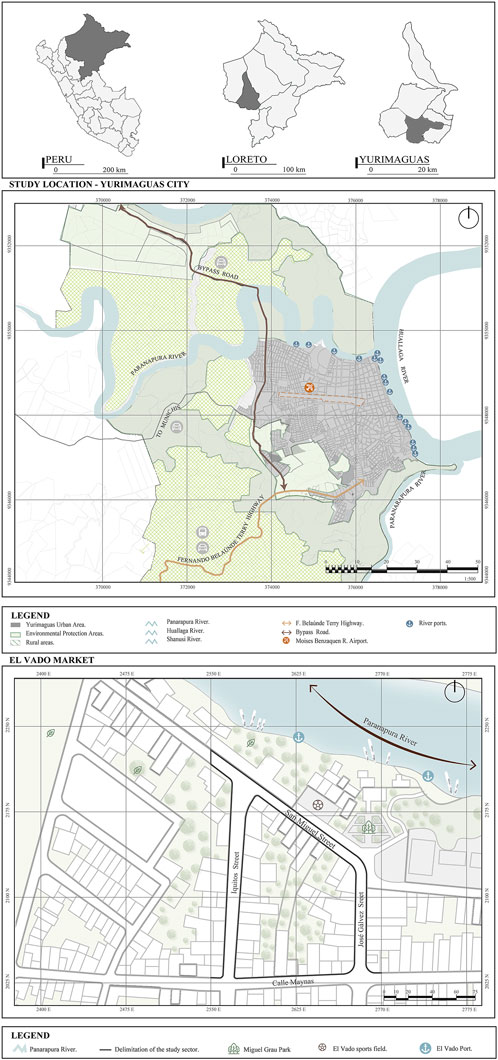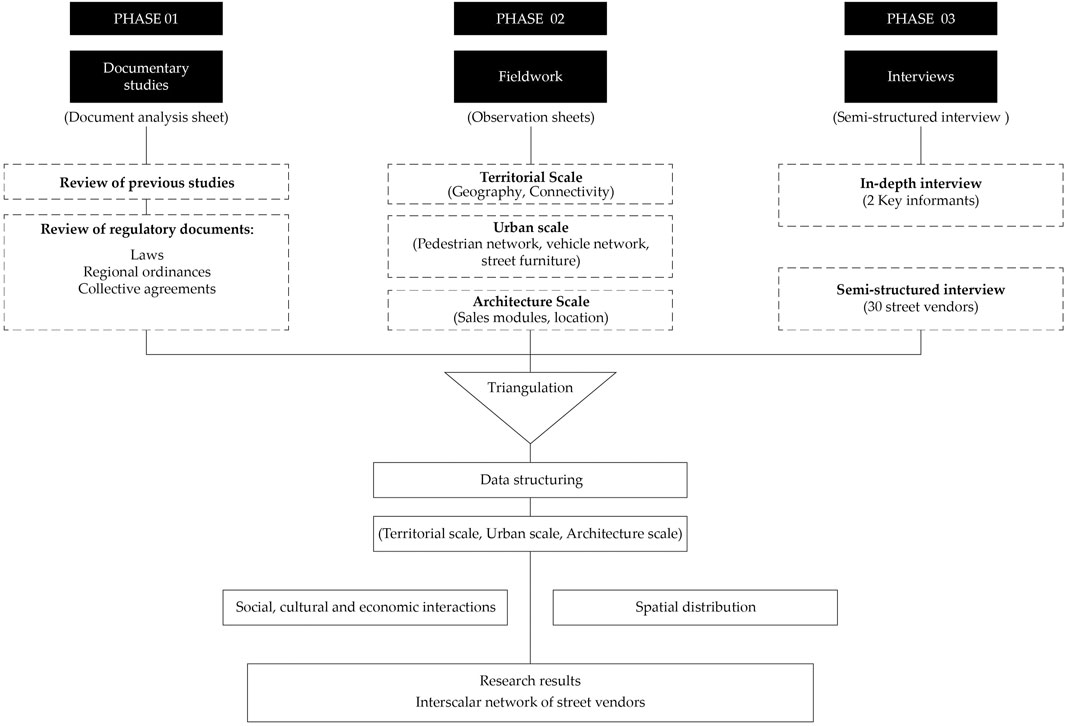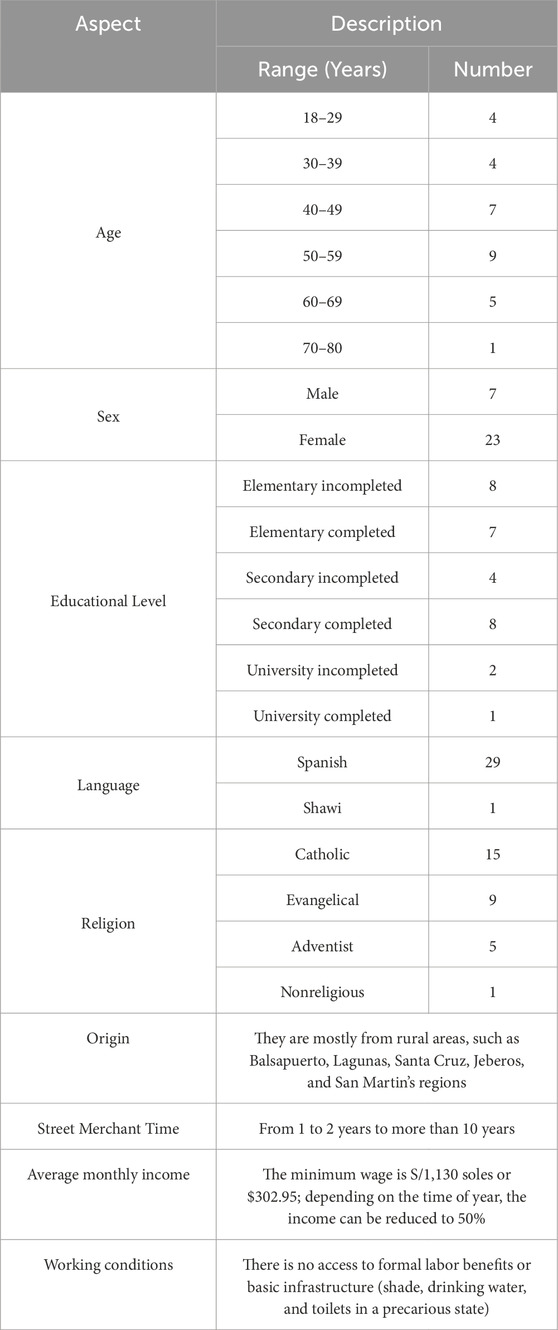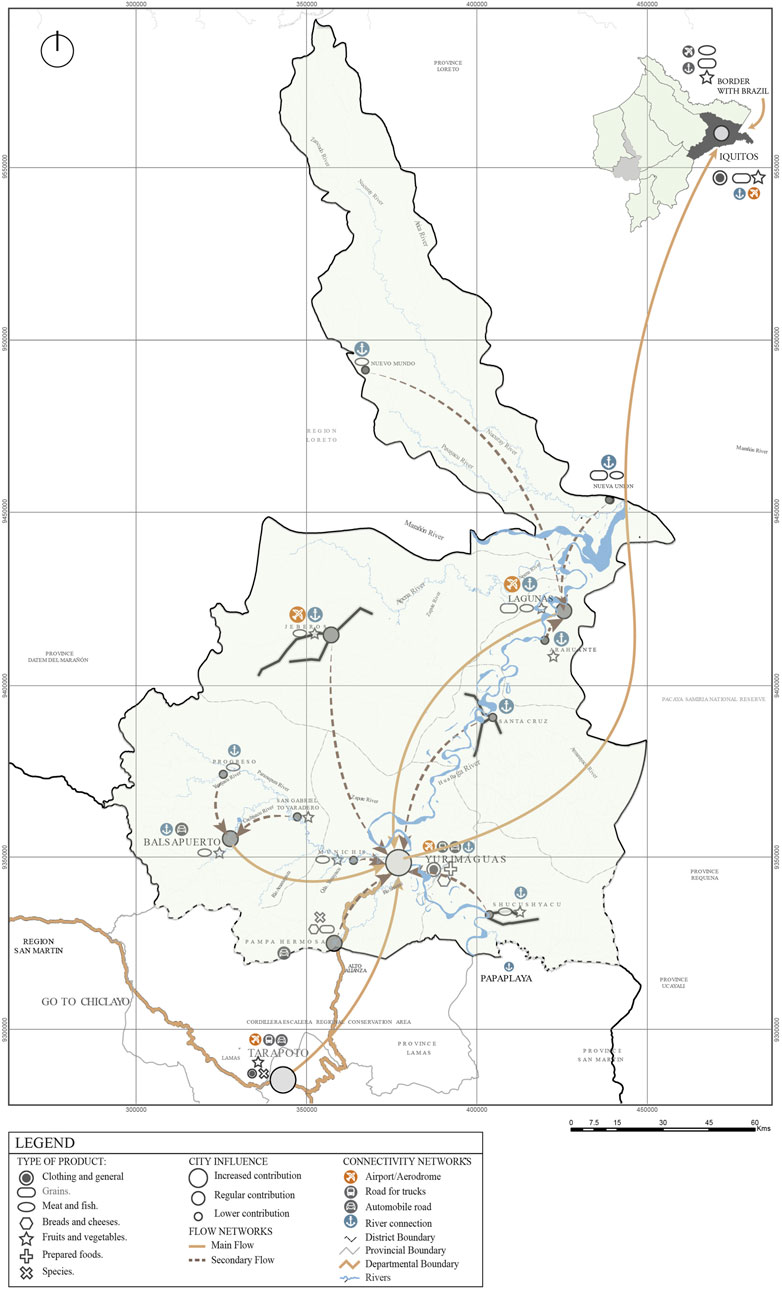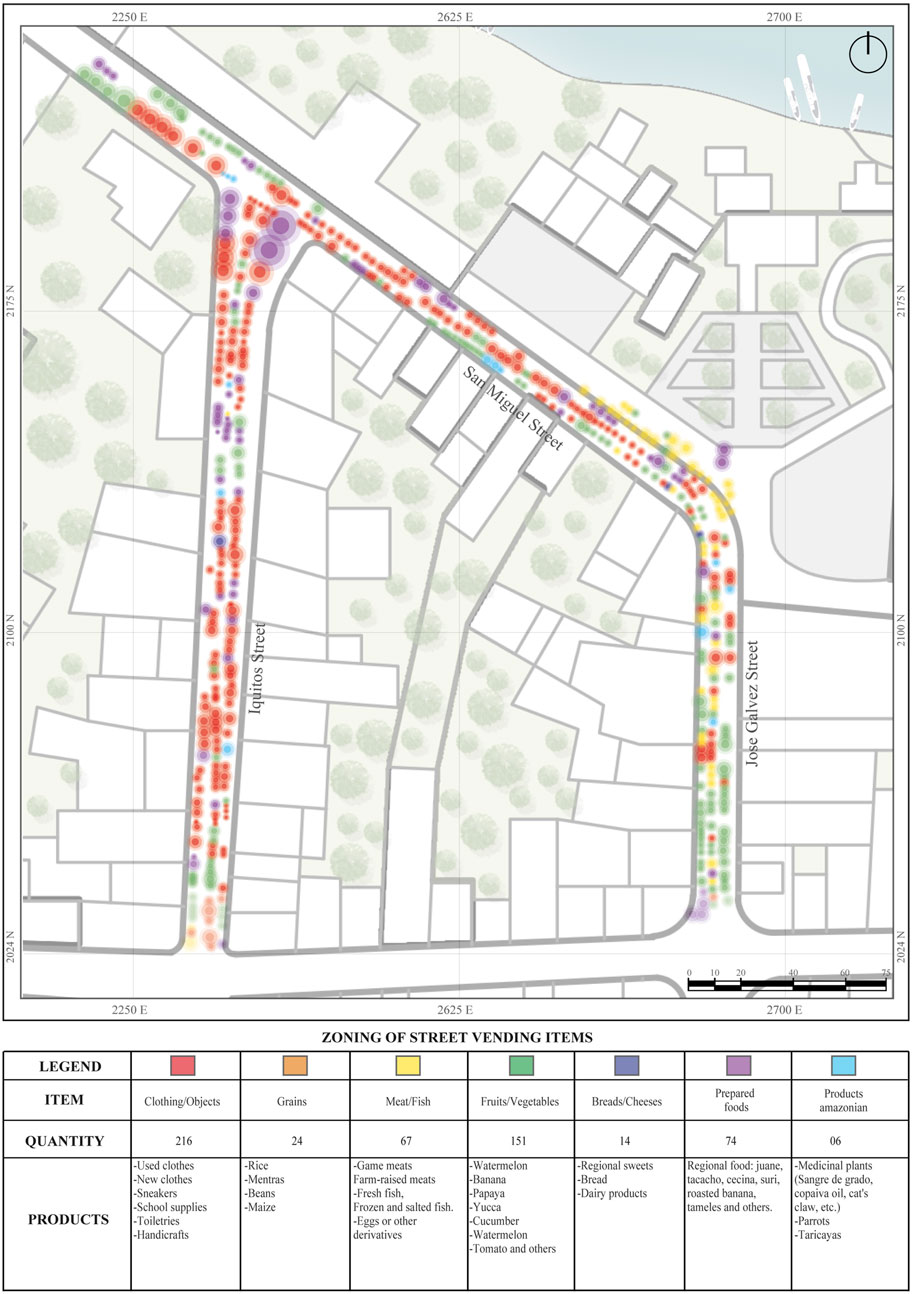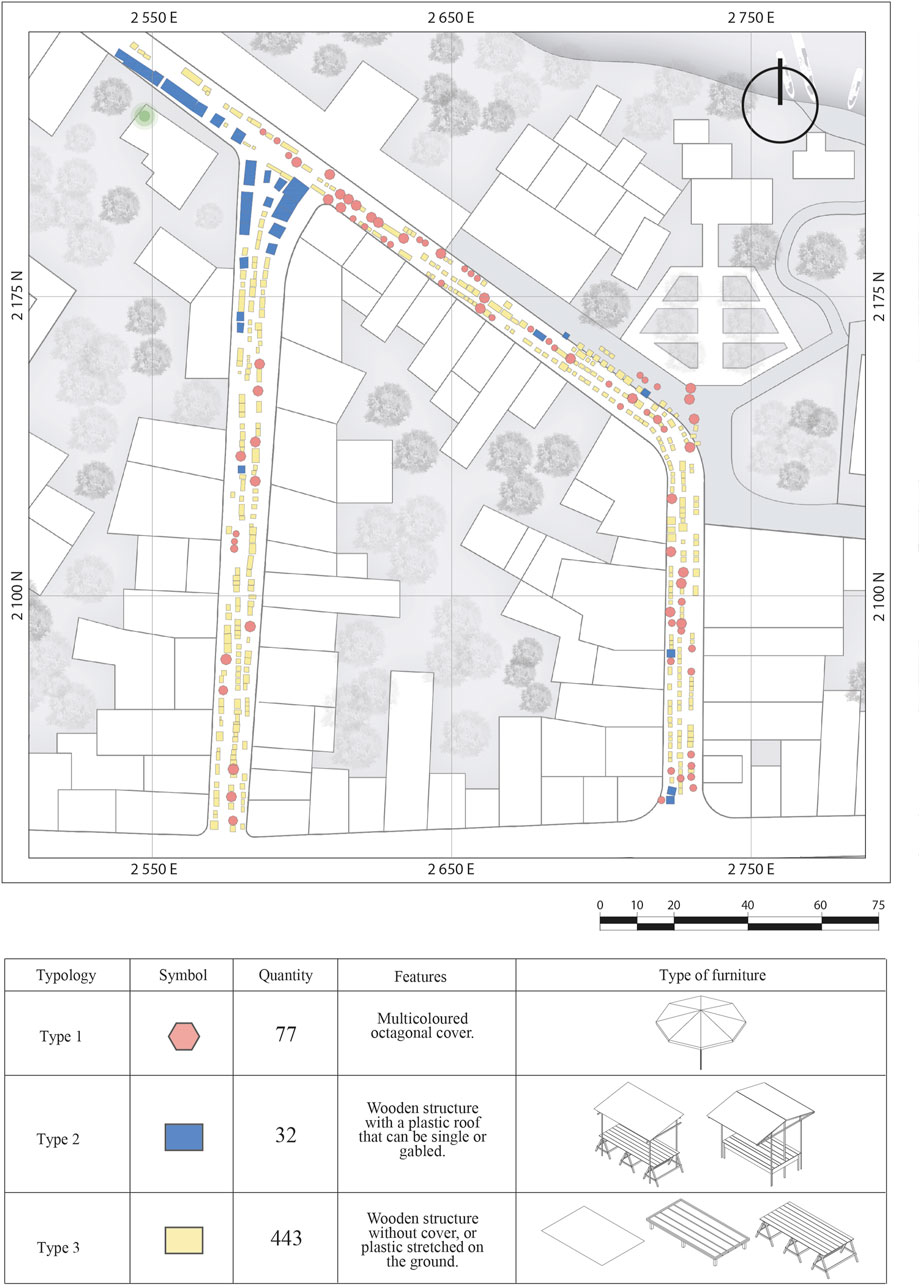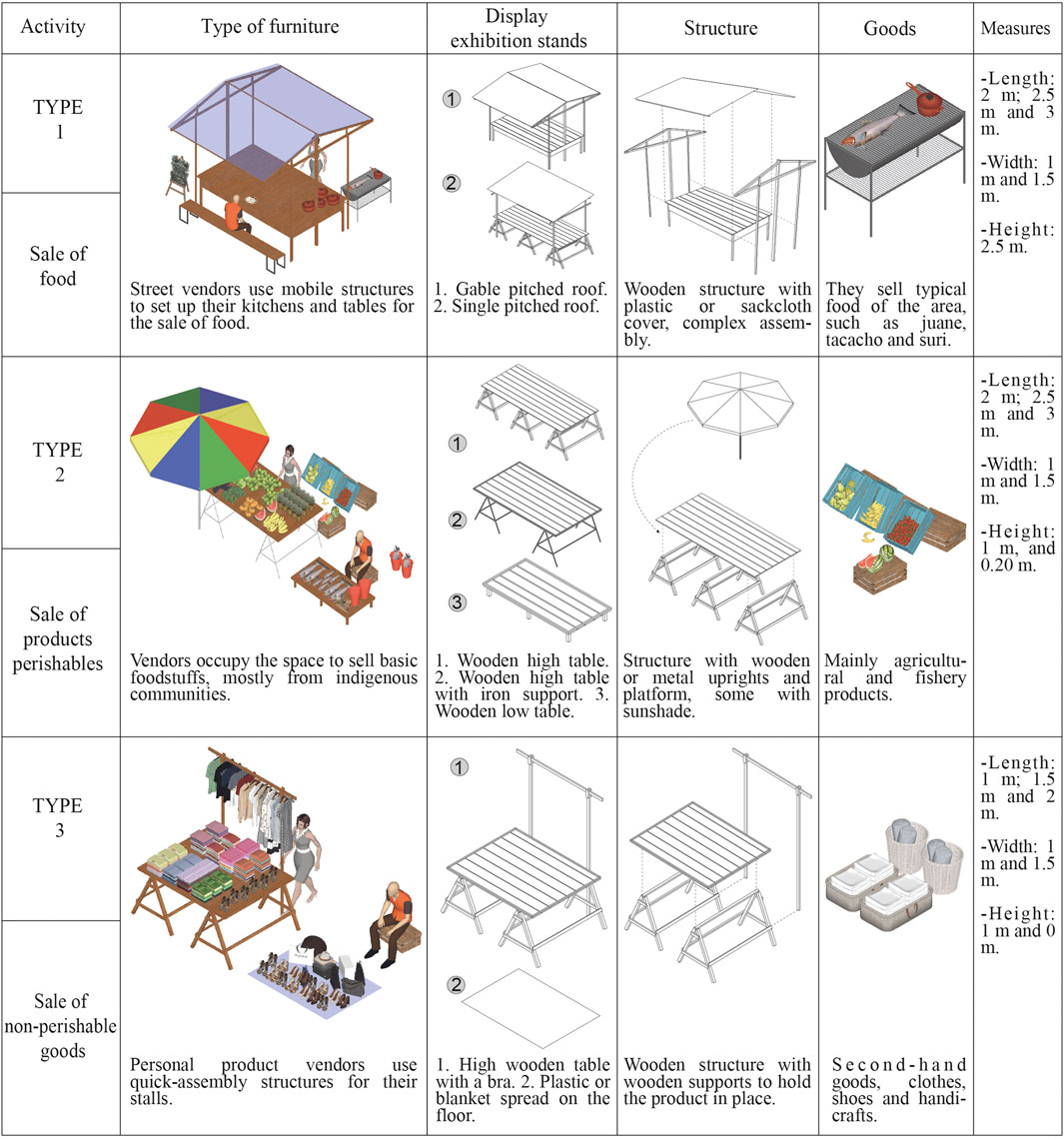- Faculty of Engineering and Architecture, Universidad Peruana Unión, Tarapoto, Peru
Street vendors contribute significantly to the informal economy of cities, especially in developing countries such as Peru, where informal employment reaches 71.2%. This phenomenon is observed in the commercial dynamics in the Peruvian Amazon, where informal trade networks connect cities and rural areas through river transport. For this reason, the purpose of this study is to understand the socio-cultural and spatial dynamics of ambulatory trade in the El Vado market in Yurimaguas, Peru. Unlike traditional studies that are limited to a single scale of analysis, an inter-scale analysis is proposed, by integrating the territorial, urban and architectural scales. From a qualitative approach, semi-structured interviews were conducted, along with participatory observation, and documentary analysis. Commercial flows, seller profiles, types of merchandise, and occupation patterns between urban and rural areas were identified. The results highlight social and commercial networks at the regional level, as well as patterns of agglomeration, which temporarily transform streets into scenarios of economic and cultural interaction. Street vendors, with their sales modules, adapt to the characteristics of the place and municipal policies. In conclusion, the socio-cultural and territorial cohesion generated by these practices could contribute to implementing a plan for managing street vending and optimizing spatial relations in the city.
1 Introduction
Ambulatory trade plays a crucial role in the economy of developing countries, providing employment and income to a large segment of the low-income urban population (Hagos et al., 2020). Globally, it is estimated that 2 billion people depend on the informal economy, representing more than 60% of the economically active population (Deléchat and Medina, 2021). In Latin America, labor informality exceeds 70% (Mauricio, 2021), with particularly high rates in Amazonian countries, such as Ecuador (58.1%) in 2022, Colombia (62.4%), and Brazil (47.8%) (Kieran et al., 2022). These data highlight the informal economy’s essential role as the primary source of employment and income in Latin American cities.
In the Peruvian Amazon, ambulatory trade is vital to the local economy. According to the Foreign Chamber of Commerce of Peru (COMEXPERÚ) (COMEXPERÚ, 2022), in 2021, 76.8% of jobs in the country corresponded to the informal sector, representing an increase of 17.2% compared to 2020. In addition, 18 of the 24 departments exceeded this average, with significant figures in San Martín (89.3%), Amazonas (88.3%), Ucayali (85.3%), Tumbes (81.9%), Madre de Dios (80.4%), and Loreto (85.9%). Due to its geographical location and extensive river network, Yurimaguas, in the department of Loreto, is presented as a relevant case study to understand the spatial dynamics of the Amazonian ambulatory trade to achieve a territorial approach.
Ambulatory trade research spans multiple disciplines in politics, economics, geography, sociology, community health, and city planning (Li et al., 2022). Among these various topics, our research focuses on the spatial appropriation of ambulatory trade through an inter-scale approach (territory, urban, and architectural) of informal trade networks that link rural and urban areas through the commercialization of products in the Amazon context (Guadarrama and Pichardo, 2020). This work also aims to expand the discussion on the understanding of the phenomenon of informality beyond traditional economic approaches, emphasizing spatial, social, and cultural strategies through the actors involved (Ojeda and Pino, 2019).
Despite these conceptual advances, ambulatory trade research faces significant limitations. On the one hand, current studies offer limited contributions to the analysis of employment in the informal economy. Furthermore, the lack of censuses and updated records makes it difficult to understand this phenomenon comprehensively. These shortcomings limit the ability to design effective strategies and increase the risk of failure to implement regulatory policies that benefit traders. In this context, addressing informal trade’s social and spatial dynamics comprehensively and considering challenges and opportunities are important. In order to address these limitations, this article aims to understand the socio-cultural and spatial dynamics of informal traders in the El Vado market, located in Yurimaguas, Peru.
In recent years, research on street vendors have been approached only at the urban or micro level, without considering the interactions between different territorial scales. For example, on the architectural scale, the studies focus on the analysis of sales modules (Ojeda and Pino, 2019; Lovanka et al., 2024), observing their spatial configuration and how they relate to the environment, but without relating them to larger scales. In urban settings, studies address the agglomeration patterns of street vendors (Akbar and Fuad, 2022; Sun et al., 2020), focusing on the spatial distribution of stalls in relation to public space, without considering essential aspects such as the origin of the products or their distribution networks. At the territorial level, some studies (Deore and Lathia, 2019; Salonen et al., 2012) show mobility networks and how they influence the distribution of vendors and markets using cartographic mapping and GIS tools. However, they do not consider the link between rural-urban flows or the structural spatiality of commerce.
Therefore, this research addresses this last limitation by proposing a methodological innovation, adopting an inter-scale approach that articulates the territorial, urban, and architectural dimensions of street vendors in the El Vado market in Yurimaguas. Through the triangulation of instruments such as observation sheets, semi-structured interviews, and cartographic analysis, it is possible to observe the networks that supply the trade, the patterns of appropriation of public space, and the sales modules. This analysis allows us to have a more comprehensive view of the socio-spatial configuration of street vendors and aligns with recent research that advocates for multi-scale approaches (Navarrete-Hernández et al., 2023).
Another common limitation in research is the weak or nonexistent integration between cultural dynamics and the spatial configuration of street vendors. Although studies such as that by Al-Jundi et al. (2022) indicate that urban dynamics significantly influence the subsistence of informal trade, they do not delve into how these cultural practices influence the patterns of occupation of public space or the structure of sales units. This gap is of utmost importance, as street vendors are much more than an economic activity; they are part of a community support network and a space for the transmission of local knowledge and identities (Little, 2001; Geertz, 1978).
In contrast, this research addresses this shortcoming by integrating observation sheets and semi-structured interviews, which reveal how vendors have adapted their sales units and cultural practices to their surrounding environment. Practices such as bartering and the transmission of ancestral knowledge are revealed, reflecting a reciprocal dependence between culture and space, and providing a better understanding of the spatial-cultural dynamics studied (Lu, 2019; Rodríguez, 2019).
A major limitation to a comprehensive understanding of informal trade is the scarcity of up-to-date empirical data. The lack of accurate field studies and censuses has hampered estimates of the magnitude, characteristics of the actors involved, and an understanding of its complex organization. Several authors (Feizizadeh et al., 2024; Liu and Liu, 2022) have used questionnaires or rapid mapping to try to fill this gap, but they have neglected the traders’ strategies, motivations, and experiences, limiting themselves to general descriptions that lack in-depth analysis (Auerbach, 2025).
This study addresses this gap by offering empirical data obtained through intensive fieldwork in the El Vado market. This study includes semi-structured interviews with 30 merchants and two key informants, field observations, photographic records, and mapping. By presenting an analysis of retail module typologies, mobility and spatial occupation patterns, and temporal dynamics, it provides valuable information that serves as a basis for designing urban policies tailored to the needs of the population. Furthermore, the integration of multiple data sources and scales of analysis offers a holistic and current perspective that enriches the academic and practical debate on street vendors in Amazonian contexts (Deore and Lathia, 2019; Addi et al., 2024).
To this end, the investigation was organized in four stages. First, a review of literature related to the subject was addressed. Second, the research methods and procedures used to investigate the phenomenon were described, along with the study context. Thirdly, the results obtained from the research were presented. Finally, these results were compared with other studies, which allowed an overall conclusion to be drawn.
2 Materials and methods
2.1 Study area
The research was conducted in the city of Yurimaguas, an important trade center of the Peruvian Amazon, located in the department of Loreto. Yurimaguas has a population of 83,554, with 62,903 inhabitants in the urban area, according to figures from the National Institute of Statistics and Informatics (Peimani et al., 2022). As shown in Figure 1, this city is characterized by being located at the confluence of several rivers. On the north, the limits are with the Huallaga River; on the south, with the Shanusi River; on the west, with the Paranapura River, which is important in cultural and economic exchange (Geography and Environment, 2019). According to the Technological Institute of Production (ITP) (Elsayed et al., 2022), there are more than 1.283 street vendors in the city of Yurimaguas. The economic poles and commercial axes of the city of Yurimaguas are located on the main roads (Av. Jáuregui, Av. Sargento Lores, Jr. Bolivar-Comercio, Jr. Tnte. Cesar Lopez, Jr. Tacna) and commercial hotspots (Mercado Central, Mercado de Moralillo, Mercado del Vado, Mercado de Mishuyacu, Mercado de la Unión) (Geography and Environment, 2019).
The market’s origins date back to the first decades of the twentieth century when the city started to consolidate as an important commercial landmark of the Peruvian Amazon. Its strategic location near the mouth of the Paranapura River on the Huallaga made it a key place for the exchange of products between rural communities and local merchants. At first, commercial transactions were carried out on the banks of the river with improvised modules made with local materials such as wood and palm leaf. Over time, the need to expand along the streets around the harbor arose due to population growth and the intensification of commercial activities. This situation created the need to organize the space, prompting the authorities to demarcate the sector and allocate the sales modules. The study focused on the El Vado market (Figure 1), a public space comprising San Miguel, Iquitos, and José Gálvez streets which are transformed into a trade center with vehicular restrictions between 2:00 p.m. and 7:00 p.m. With approximately 550 merchants with permanent positions, this place is widely recognized as a focus of socio-cultural and economic interaction in the Amazon, making it an ideal setting to examine the dynamics of the ambulatory trade and its impact on public space.
2.2 Research design
This study employs a qualitative approach to address the need for a holistic, contextual, and detailed analysis (Cresswell, 2009). The case study design is appropriate for this purpose because it can delve into a complex phenomenon within a specific context (Vasilachis, 2006), allowing ambulatory commerce’s socio-cultural, spatial, and economic particularities to be captured through the participants’ subjective experiences. The techniques used were documentary research, fieldwork, and semi-structured interviews. When used together, they enabled the collection and analysis of relevant information. The data obtained were triangulated to gain a complete understanding of the phenomenon and to validate the results by means of the convergence of information from different sources (Aguilar and Barroso, 2015). The data obtained were structured and analyzed from an inter-scale perspective, allowing for the integration and contrast of different scales of analysis: territorial, urban, and architectural. This approach allowed for an understanding of the interrelations and complex dynamics that characterize street vendors in the studied context. Figure 2 illustrates the methodological flow of the research.
2.3 Data collection
First, a literature review of national and international studies on ambulatory trade in public space and current regulations in Yurimaguas was carried out. Among them, Municipal ordinance No. 022-2023-MPAA-Aestablishes rules on the use of public space and sanctions for violators. A previous studies the ILO (Mauricio, 2021) recommends improving the regulatory and political environment to guarantee labor rights in the informal economy. Likewise, the Congress of the Republic of Peru, through its organic law of municipalities (Law No. 27972), grants powers for the regulation of ambulatory trade with the purpose of ordering and in some cases prohibiting these activities in public spaces. This review provided the theoretical and normative foundation for the research.
Second, fieldwork was conducted at the El Vado market during 2024. Through participant observation at various times of the day, we sought to understand the dynamics of street vendors. Observation sheets based on previous research (Feizizadeh et al., 2024) and tools such as AutoCAD, QGIS, drones, and professional cameras (videos and photographs) were used. Due to the sale of illegal products in some areas, sketches and field notes were used to identify the physical characteristics of the site. Information was collected on spatial characteristics at three scales: territorial (geography, accessibility, commercial routes), urban (public facilities, land use, urban profile, vehicular and pedestrian network), and architectural (location and categories of sales modules).
Finally, semi-structured interviews were conducted with 30 traders and 2 key informants selected through non-probabilistic convenience sampling. To ensure data validity, the theoretical saturation technique was used in the selection of participants. This allowed data collection to continue until no new significant patterns were identified, indicating a complete understanding of the phenomenon under study. A question guide was used, but the interviewer was free to add additional questions to deepen participants’ responses (Hernández et al., 2014). This method was chosen due to its flexibility and ability to adapt to the interviewees’ context. The interviews, lasting 15–20 min, focused on ambulatory trade and appropriated spaces. Beforehand, each participant was informed about the characteristics of the study, and informed consent was obtained. Data was collected in person at the El Vado market from July 15 to 19, 2024, from 2:00 p.m. to 7:00 p.m. The answers were recorded in audio and transcribed into field cards. The inclusion criteria for the interviews was: merchants from the El Vado market, with a position assigned by the Municipality, must be over 18 years of age, have more than 1 year working in trade, and participation was voluntary. On the other hand, those who work from home or outside the market were excluded. Between 5 and 7 merchants declined to participate in the study, either because they did not agree to sign the informed consent or because they were busy selling products. The interviews contributed to understand the traders’ motivations, experiences, and work routines.
Interviews with two key informants, selected for their professional experience and direct knowledge of street vendors in the city of Yurimaguas, allow us to contrast the voices of the vendors with institutional and technical perspectives on the phenomenon. The first informant was a technician from the Provincial Municipality of Yurimaguas who, with more than 10 years of experience working in local economic oversight and development, provided us with detailed information on the implementation of Municipal Regulation No. 022-2023-MPAA-A, the criteria for allocating public spaces, and the municipality’s limitations regarding the management of street vendors. The interview lasted 25 min and allowed us to contrast the regulations with the actual practices of vendors, revealing a significant gap between regulations and their implementation, as well as information on their internal organizational structure and future institutional proposals.
The second key informant was a representative of the El Vado informal market, who has been active as a merchant for over 15 years. He explained how the market is organized internally, the strategies for occupying space, the negotiations with the municipality, and the forms of self-management among the merchant groups. The interview lasted 20 min and resulted in an understanding of the internal workings of informal trade social networks and how these influence the distribution and occupation of space, as well as conflict resolution. The interviews were essential for broadening our understanding of the phenomenon from an institutional and organizational perspective, providing elements for an inter-scale interpretation of street trading by linking regulatory decisions (territorial scale) with concrete practices in public space (urban scale) and individual adaptation strategies (architectural scale).
2.4 Data analysis
Data from various sources were triangulated, allowing for cross-referencing of the collected information to reduce bias and increase the validity of the results. Additionally, an inter-scale approach was adopted that considers the territorial, urban, and architectural dimensions as interdependent elements that make up the street vendor system.
• In the territorial dimension, the connection of street vendors to the Amazonian environment was analyzed through river and land access networks for the supply of products. Local and national products were identified, as well as cultural practices that transcend commerce, demonstrating the interdependence of the market and rural communities.
• In the urban dimension, the delimitation of the market within the structure of the city, agglomeration, and the flow of people, goods, and culture in public spaces were examined. The information is related to the perceptions of the vendors.
• In the architectural dimension, the typologies of sales modules were identified through physical and structural characteristics and sales categories. Three-dimensional graphs of the types were made to present the data clearly.
3 Results
Four main findings are presented: first, ambulatory trade is characterized by the flexibility and adaptability of their merchants, who, through their commercial practices, reflect the values and traditions of Amazonian culture. It integrates local and national products, as well as cultural practices that transcend commerce, demonstrating the interdependence of the market; second, the territorial scale is demonstrated by access to products through land and river networks, demonstrating the interdependence between the market and rural communities; third, the El Vado market acts as an urban exchange node for the flow of people, goods, and culture; and fourth, the sales modules are ephemeral and adapt to the needs of commerce, climate, and demand. These findings reveal an interconnected system that integrates territorial, urban, architectural, social, and cultural aspects.
3.1 Street vendors
To analyze the profile of street traders in the El Vado market, we must look at Table 1, which shows the diversity in age, gender, educational level, and religious beliefs. Most merchants are between 50 and 59 years old (27%), and 79% are women, which shows a predominant female presence in this region’s ambulatory trade. Regarding education, 31% have only incomplete primary education, and only 3% have reached some higher education level, reflecting limited access to formal education. Regarding the language, 97% of the merchants speak Spanish, while one speaks Shawi, an Amazonian language, representing a connection with the local indigenous culture. Religiously, a distribution is observed between Catholics (47%), evangelicals (34%), and Adventists (16%), showing a plurality of religious beliefs.
The origin of merchants is mainly from rural areas such as the districts of Balsapuerto, Lagunas, Santa Cruz, and Jeberos, as well as from the regions of San Martin, and their age in the market varies from 1 to more than 10 years, indicating an internal migrant population with experience in informal trade. Monthly incomes are low, ranging from the minimum wage of 1,050 soles or 282.35 dollars to 50% less than this, without access to labor benefits or basic infrastructure.
Merchants also pointed out that the lack of formal employment opportunities and the need for immediate income were the main reasons for engaging in ambulatory commerce. For many, this activity represents an accessible and flexible option to generate income, although some inherited this type of business. The choice to work on the street stems from the inability to afford formal premises due to high rental costs, while the preference for strategic locations in public spaces is driven by higher foot traffic or the need for shade and protection from harsh weather conditions. In addition, merchants organized themselves autonomously over time, positioning their modules and collaborating with other merchants to avoid conflicts by sharing spaces. All merchants must have a permit granted after the Municipality registers them in the position it has chosen to carry out their activity.
A merchant who has been selling for approximately 10 years in the market claims that “everything was born from the trade that took place in the harbor. The routine of merchants at that time consisted of the exchange or sale of farm products that they brought from different communities to supply the central market. Over time, a small market that exists to this day was formed, with the only difference that it extended across 3 streets near the harbor. The schedule was fixed from then on because sellers from different communities arrived at the harbor in the afternoon, as they transported their products by boat along the Paranapura river […].”
Urban and rural merchants are characterized by their adaptability and flexibility in their sales methods. Producers begin their workday early, traveling up to 14 h from rural communities to offer their products directly at the market. Many merchants travel from one market to another to maximize their sales opportunities. Some merchants work in the morning at the city’s central market and offer their services at the El Vado market in the afternoon. Rural merchants often incorporate traditional elements into their products, although they face logistical challenges related to land and river access networks. In contrast, urban merchants in the El Vado market, while benefiting from some municipal regulation in terms of safety and cleanliness, still lack formal recognition and access to basic services. These differences reflect the social, cultural, and economic complexities of the area.
The El Vado market not only functions as a space for economic exchange, but also as a social and cultural hub that articulates multiple relationships between merchants, customers, suppliers, and local authorities. This space intertwines economic interactions such as buying and selling, informal credit, and barter, as well as distribution networks with rural suppliers who arrive by river and land in the afternoon. “Sometimes I don’t have any change, but the vendor who is a neighbor to my stall lends me money and I pay her back. We’ve known each other for years […]” (fruit seller, 34 years old), evidencing economic practices based on mutual trust.
From a social perspective, the market functions as an everyday space for friendship, kinship, and neighborliness, where food is shared, vendors tend to their stalls, and informal collaborative relationships are established. One vendor commented: “When I have to use the restroom, my neighbors help me take care of my stall. We’re like family here […]” (fish seller, 57 years old), reinforcing the idea of a mutual support network built on daily coexistence.
On a cultural level, this space also serves as a point for transmitting traditional knowledge, exchanging indigenous Amazonian languages such as Shawi, and local culinary practices. The presence of products brought from communities such as Jeberos and Balsapuerto was observed, accompanied by narratives about their origins. Furthermore, contact with national and international tourists contributes to strengthening a shared Amazonian identity, visible in the use of language, clothing, and the sale of handcrafted products, which have diminished over time.
Finally, regarding governance, relations with the municipality are perceived as tolerant but limited. Merchants access occupancy permits through symbolic payments, which in turn support basic services such as cleaning and security. “Sometimes they support us with cleaning and provide us with security through the municipal security guards, but they also tell us we can’t leave the area […]” (handicraft products seller, 74 years old), noted an informal merchant, evidencing an ambiguous relationship of control and negotiation between the informal sector and the local authority.
3.2 The three scales of street vending in Yurimaguas
3.2.1 Commercial landscape in the territory
River networks, especially in the Amazon, are relevant for transport and trade in areas with limited land access. These are connected to commercial nodes distributed throughout the territory, which supply resources to cities with greater hierarchy.
The configuration of the commercial network on a territorial scale is composed of urban and rural areas, as seen in Figure 3, which are interconnected through river networks. These cities are organized in three orders according to their influence, geographical and economic importance. They are located and connected through the basin of the Shanusi, Paranapura and Huallaga rivers, as is the case of the harbor of El Vado where boats and boats arrive, according to the type of product they transport, and by air networks, which allow a rapid connection between different towns.
The geography of the territory, marked by extensive forests and large rivers, reaffirms the need to use the river network as a means of transport for trade between cities, as well as providing the necessary means for this activity to develop through the use of river motorboats, speed boats and boats, which travel through the towns and reach the harbors of the city of Yurimaguas. Here, the goods are delivered and marketed in smaller quantities at early hours of the morning and greater quantities during the afternoon.
The conditions of the territory allow for a meaningful commercial exchange, resulting in a network of flows between different nodes of cities, with the city of Tarapoto being a key point in the supply of products and services from the Peruvian coast. Within this network, the city of Yurimaguas stands out due to its strategic location in goods trade. At the same time, Amazonian cities such as Iquitos stand out by providing goods such as clothing, grains, fruits and vegetables typical of the Amazon such as bananas, macambos and aguajes. In addition, the nearby districts such as Munichis, Jeberos Lagunas, Balsapuerto, which are located from 2 to 6 h from the city of Yurimaguas are dedicated to the production and trade of goods such as Grains, Meat, and fish, fruits, and vegetables, such as bananas, citrons, regional tomatoes, camu camu.
This exchange of products and goods consolidates the city of Yurimaguas as a hub of economic and commercial development in the Peruvian Amazon, which carries out exchanges with large cities and nearby towns with lower hierarchies.
3.2.2 Commercial network in public space
Commerce in the El Vado market occupies public space, which serves as a setting for economic, social, and cultural activities. The occupation of Jose Galvez, San Miguel, and Iquitos streets with their physical characteristics and urban environment, and the temporality in its use, are its main highlights. The activities are repeated daily in the area between 2:00 p.m. and 7:00 p.m. In addition, as a result of the surveys and observation sheets an occupancy pattern was identified at the urban scale.
In Figure 4, characteristics of the spatial organization at the urban scale are identified through the merchants’ items and the number of merchants for each item of sale. Clothing is the main item of sale, with 216 stalls, distributed predominantly along Iquitos street where people usually leave the market. This category includes products such as used clothing, new clothing, footwear, school supplies, cleaning supplies, and handicrafts from the city of Tarapoto. There are also products from the border with Brazil (through the city of Iquitos), due to the agreements between Peru and MERCOSUR, which facilitate economic and commercial exchange in the region.
On the other hand, the fruit and vegetables category has 151 stalls, located in José Gálvez street, which is the main entrance to the market. This sales category offers watermelon, banana, papaya, cassava, cucumber, aguaje, and tomatoes. These types of products come from the rural areas of Yurimaguas. Moreover, the meats and fish category is strategically located on the corner of Jose Galvez and San Miguel streets, in proximity to Plaza Miguel Grau and the access to the harbor. It has 67 stalls that offer game meats, farm meats, fresh frozen and salted fish, eggs, and other byproducts. These products are mainly from rural areas and rivers around Yurimaguas: Huallaga, Shanusi, and Paranapura.
The prepared food section is also located on the corners or intersections of the market streets. It's worth noting that this section is highly sought after by users and has 74 sales modules offering products such as regional Amazonian food, such as juane, tacacho, roasted jerky, grilled suri, grilled bananas, tamales, and others. Grains are an important category, and 24 stalls offer products such as rice, legumes, and cooking utensils. The category with the fewest sales modules is animal species, with only 6 stalls where products such as medicinal plants, parrots, and Yellow-spotted river turtle (Podocnemis unifilis) are offered irregularly due to present regulations against wildlife trafficking. All these trade activities reinforce Amazonian culture, which lies in the region’s production, the tradition of crops, and the tradition of commercialization.
Each sales item is important in the physical and spatial composition of the study area evidencing that, on the urban scale, the organization of the stalls is flexible. The different commercial activities generate diversity since they coexist, integrate and complement each other.
3.2.3 Shopping streets
When analyzing the spatial distribution of the sellers, it is observed that it responds to patterns defined by the road accessibility of José Gálvez, San Miguel, Iquitos streets, and El Vado harbor. The functionality of these public spaces reflects a strategic occupation along two central corridors that allows for the adaptation of the stalls to the circulation of buyers and merchants. Trading hours differ from those of other markets that usually operate from 5:00 a.m. Morning sales are not the most common because the merchants are at the harbor receiving the products they will later sell.
The hours of greatest pedestrian flow are concentrated between 5:00 p.m. and 7:00 p.m. since in Yurimaguas, with a hot and humid weather where temperatures range between 23°C and 33°C, public spaces becomes more accessible as the intensity of the sun’s rays decreases. This drop in temperature allows a more significant influx of people, facilitating circulation and making travel more comfortable. During this period, the ambulatory market reaches its peak of activity, attracting buyers and passers-by who take advantage of the most favorable weather conditions to make their purchases or transit through the area.
In Figure 5, in the morning, José Gálvez street appears empty and free of merchants, occupied only by some vehicles. On the other hand, in the afternoon, the space is restricted to vehicular traffic and filled with merchants, evidencing a marked contrast in its occupation at different times of the day. On José Gálvez Street, as shown in Figures 5A–E street traders occupy a block organized in three rows, leaving two 1.50 m corridors for buyers to circulate on a paved road 6 m wide. During the first hours, these corridors allow a relatively smooth flow of people. However, as the day progresses and traffic increases, especially in the access areas and at the intersection with San Miguel Street, where bottlenecks are generated due to the large volume of pedestrians and buyers (Figures 5A,B). At this intersection, informal trade tends to extend beyond the roadway, taking advantage of an adjacent space and causing a greater concentration of people. In addition, the proximity of Plaza Miguel Grau, which often brings crowds together for shows and recreational activities, further increases the influx and congestion in the area.
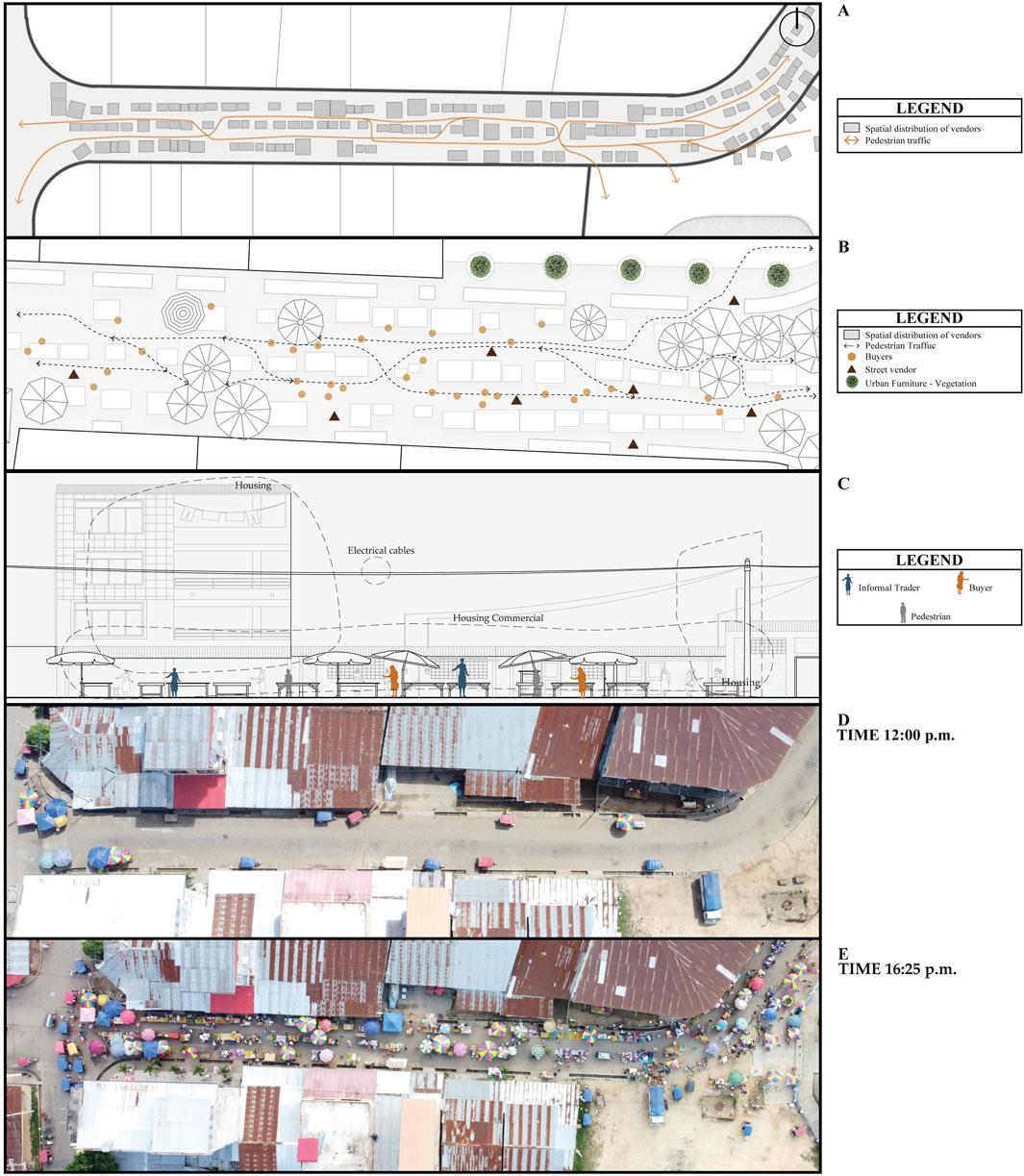
Figure 5. José Gálvez Street: scheme and temporality, (A) spatial distribution of vendors, (B) buyer circulation network, (C) urban environment, (D) before and (E) after commercial activity. Source: Own elaboration.
Although San Miguel Street has homogeneous characteristics in terms of width and materiality, the organization of ambulatory trade is considerably more chaotic, as shown in Figure 6. Two rows of merchants predominate, generating a central corridor of approximately 1.80 m for pedestrian circulation (Figure 6A), although stalls selling food and other products that try to form a third row have been observed. Some of these stalls even invade part of Plaza Miguel Grau, significantly affecting the buyers’ flow and generating confusion (Figure 6B). Like other streets in the sector, San Miguel suffers from bottlenecks, especially at the intersection with Iquitos Street, where the density of stalls increases (Figure 6DE). This disorganized arrangement of merchants in the area complicates pedestrian movement and compromises accessibility.
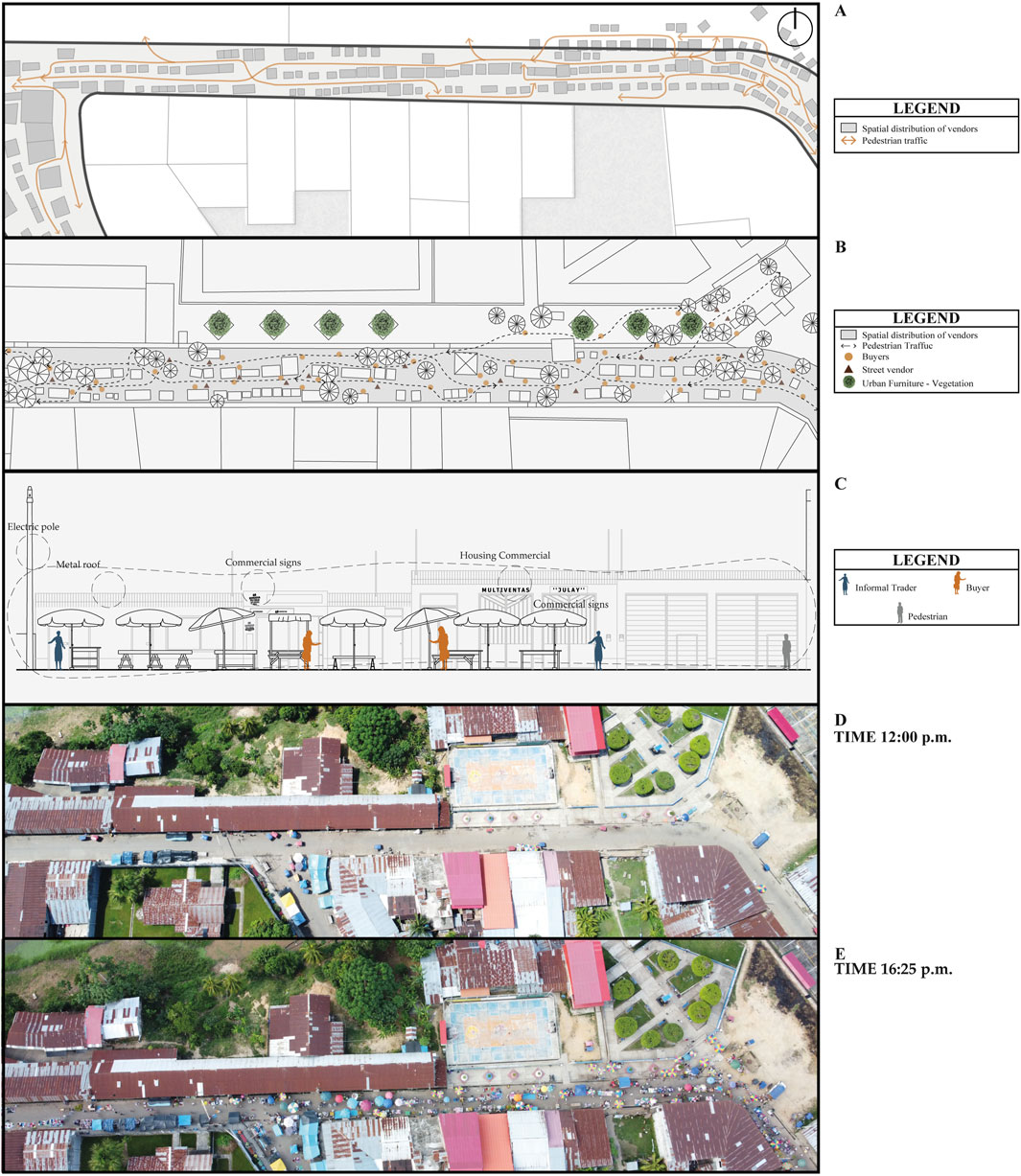
Figure 6. San Miguel Street: scheme and temporality, (A) spatial distribution of vendors, (B) buyer circulation network, (C) urban environment, (D) before and (E) after commercial activity. Source: Own elaboration.
Likewise, Iquitos Street is distinguished by the variability in the sales stands layout. As shown in Figures 7A–E, at the beginning, three rows of merchants are observed, which are then reduced to two as you progress along the street, to later increase again to three rows when approaching the intersection with San Miguel Street. This dynamics reflect an inefficient organization that affects commercial order and pedestrian traffic. The road’s uniform width is 6 m for most of its route, but it extends to 9 m at the intersection with San Miguel Street. Merchants take advantage of this greater breadth to increase the number of stalls, which, while it may seem beneficial from a commercial point of view, increases clutter and further reduces efficient transit capacity in the area.
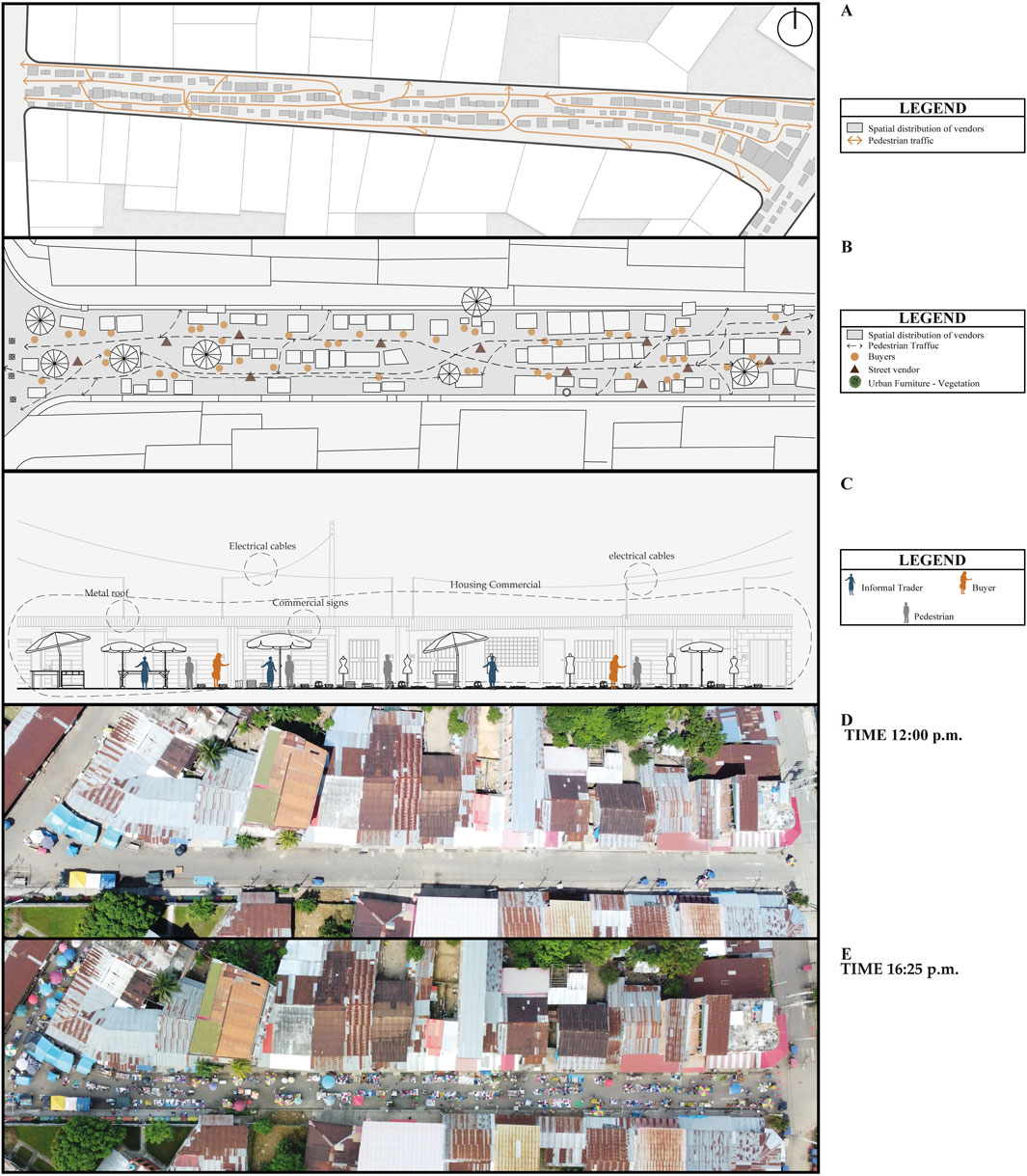
Figure 7. Iquitos Street: scheme and temporality, (A) spatial distribution of vendors, (B) buyer circulation network, (C) urban environment, (D) before and (E) after commercial activity. Source: Own elaboration.
3.3 Spatial typology of sales module
By analyzing information collected through interviews and observation sheets, it was possible to identify the diverse distribution of stalls positions in which the need to offer their products in a limited space is reflected. The modules are located in strategic areas defined by the sellers themselves. They are located at the tracks entrances and are divided by two central corridors that allow the buyers to circulate.
The classification of the sales modules is organized into two groups based on their structure and the activities they carry out during the occupation of the roads. Each group is divided into three types according to its characteristics. These basic architectural units consist mainly of removable, DIY structures made of wood, a natural resource from the area. Approximately 32 modules have blanket coverage, another 77 contain beach umbrellas that provide shade, and the most relevant event is the 443 posts that do not have a cover to protect themselves from climatic factors. This fact is mainly due to the schedule in which trade activities occur (Figure 8).
Likewise, street traders adapt both their sales strategies and their modules’ furniture according to the product category (Figure 9). Fruit and vegetable sellers use organized baskets and boxes to display what they have with wholesale and retail offers. The prepared foods are presented on tables covered with plastic and accessible utensils, offering tastings of typical foods from the area. In the clothing and footwear category, tables, mannequins, and shelves are used, although in some cases, blankets extended on the floor are incorporated to sell used products called cachina. Toys and accessories are arranged at low tables accessible to children, encouraging them to shop. The crafts are displayed on wooden counters or decorated tables, highlighting their cultural value and explaining their origin. For essential items, furniture consists of shelves with high-demand products in front, with promotions by quantity and wholesale prices. These strategies, supported by furniture adapted to their needs, allow for optimizing the visibility and accessibility of the product, thus improving the customer’s interaction with the store.
• Type 1: Belongs to the food sales activity which contains a complex modular form, because it consists of a table and a wooden structure for covering plastics or gable blankets. Unlike other types, its elements are larger. In these spaces, merchants offer products based on the area’s typical foods, such as juanes, tacachos, regional chaufa, roasted suris, fried macambo, and many others that eases the hunger of people who visit the market.
“I work here in the El Vado market selling the famous antojitos or asaditos. This succulent food is the attraction of many tourists. As you can see, I have roasted suris, the famous juanes, tacacho with chicharron, roasted fish and many other things. In this case, to be able to sell I made this wooden module with its roof, to protect from the sun those who sit and eat at the table that I have attached to this structure. At the end of my work I have to dismantle all this to be able to withdraw from the street, and take it to a warehouse near where I am selling […]” (Regional food vendor, age 57);
• Type 2: The merchants of perishable products use wooden tables with umbrellas which, because they have the most limited space, are easier to install to protect their products from solar radiation. This covering system is an industrial structure that allows the seller to quickly assemble it to provide shade for their products.
“I use this work tool because I need to protect my products from the farm: my chickens, taricaya eggs, bushmeat, my fresh fish, which can be damaged by direct contact with the sun, and so I could no longer sell them. In addition, these umbrellas are easy to assemble and transport […]” (Seller of regional products, 50 years old);
• Type 3: It is the most minimalist way of occupying the space and is used by the merchants of non-perishable products, which, having no direct contact for human consumption, are exposed in modules that do not have a cover or are scattered on the floor (on a blanket or in some plastic material such as buckets or trays) available to buyers.
“I sell wallets and backpacks, which are brought from the city of Lima. I use bags or blankets extended on the ground that, for the type of sale I have, I do not need to show in an easel because obtaining these modules also generates me expenses in transport or storage […]” (Seller, 48 years old).
“I am dedicated to selling plastic products, glass glasses, and other products from Lima. I usually use a stand with an easel for sale, but I do not need a cover because I am located in a privileged area with shade in the afternoon. I also have a place where I store my products and my stall. I pay 2 soles per night and this allows me to save on transport payment […]” (Plastic store saleswoman, 40 years old).
A limitation of the study is that data collection was conducted over a specific period of time, so holiday sales modules were not considered. The analysis of the types of sales modules in the El Vado market reflects merchants’ ability to adapt to the environment’s economic, socio-cultural, and spatial conditions. These modules are far from simple sales structures. They express the flexible, diverse and multifunctional use of public space in the Amazonian city of Yurimaguas.
4 Discussion
Ambulatory trade in Yurimaguas is deeply rooted in local culture and reflects the socio-cultural diversity of the Amazon region. Merchants, primarily women from rural areas or migrants from other Amazonian regions, form a cohesive community that perpetuates traditional knowledge, production practices, and cultural values by selling local and regional products. These socio-cultural dynamics align with the theory of traditional social networks in informal economies, highlighting the transmission of knowledge and cultural values (Geertz, 1978). In turn, merchants’ demographic and educational structure show a trend toward low educational levels, which limits their options for formal employment. Thus, driving them to engage in ambulatory trade as the only means of subsistence, an everyday reality in many developing countries (Hagos et al., 2020; Sekhani et al., 2019). In addition, merchants’ religious and linguistic diversity reinforces this market’s inclusive and resilient character, working as a space for social integration.
Regarding the relationship between ambulatory commerce and the Municipality, it is characterized by a relatively harmonious coexistence, marked by regulatory and collaborative efforts that seek to minimize conflicts between merchants and the authorities. Merchants obtain permits to operate in public space under a scheme of accessible rates that finance the cleanliness and security of the area. This model includes temporarily managing the streets and closing them to vehicular traffic during the afternoon to facilitate commercial activities. Unlike other cities, where vendors face evictions or harassment, Yurimaguas has a tolerant approach that fosters an environment of stability and cooperation.
From a territorial perspective, economic activity in Yurimaguas largely depends on the river networks connecting rural and urban areas, a fundamental characteristic of Amazonian economies. Studies such as that of Rocha (2022) and Rodríguez (2019) Rodríguez point out that the river is an axis of subsistence and connectivity, not only for the mobilization of goods but also for the integration of cultural and economic practices. Yurimaguas, as a commercial node, illustrates the importance of these river networks, reinforcing the findings of Caro and Ortega (2002), who highlight the centrality of the river in the socio-economic structure of these regions.
At the urban level, the El Vado market presents a pattern of temporary occupation that allows vehicular mobility to coexist at different times, optimizing the use of space. However, during peak hours, the large influx of people generates bottlenecks at specific points, a common problem in informal markets where congestion and lack of order affect circulation and accessibility (Adama, 2020). This type of spontaneous occupation, where merchants take advantage of the environment’s opportunities to the detriment of accessibility, has been identified in other studies on informal markets as a sign of the appropriation of public space (Shamekh and Ashour, 2022). In Yurimaguas, the streets with more significant commercial activity, such as San Miguel, Iquitos, and José Gálvez, reveal how this informal commercial organization directly impacts mobility and the use of space.
At the architectural level, the sales modules’ adaptability reflects merchants’ creativity and flexibility in the face of commercial infrastructure limitations. The structures, which vary from unroofed stalls to modules with umbrellas or removable wooden structures, are adapted to the needs of each type of product and category. This type of ephemeral architecture not only responds to the functional needs of commerce but also represents a form of temporary space use that allows flexibility and adaptation to climate and variations in demand.
Likewise, the analysis of these modules shows the characteristic adaptability of informal traders, who create temporary structures in response to the needs of their environment, agreeing with De Souza (2020). The merchants of the El Vado market implement these removable and lightweight structures that allow them to respond to climatic conditions and a high influx of people. This system differs from others, such as the Matamoros market, where informal trade relies on networks of tarps for protection (Seve et al., 2021). The classification of typologies that distinguishes between mobile and semi-mobile groups, according to Adama (2020), is also evident in Yurimaguas, where merchants adapt their modules and schedules according to the flow of customers, creating a vibrant space for social interaction, as suggested by Karsono et al. (2023), and Muktiwibowo (2018).
Finally, local regulation sets the El Vado market apart from other informal markets worldwide, where merchants face constant threats and evictions (Kumari, 2006). In Yurimaguas, the Municipality maintains some control, providing security and cleanliness. However, according to Karthikeyan and Mangaleswaran (2014), merchants still lack formal recognition and access to basic services, a common situation in informal markets.
5 Conclusion
In conclusion, ambulatory trade in the Amazonian public space of Yurimaguas constitutes a complex and dynamic system that integrates the three scales studied: territory, public space, and architecture. These scales interact interdependently, forming a resilient trade model that adapts to the particularities of the urban environment, economic demands, and social dynamics of the region. The interaction of these scales demonstrates how ambulatory commerce not only meets the economic needs of merchants and consumers but also contributes to the social, cultural, and spatial configuration of Yurimaguas. This dynamic system reaffirms the market’s role as a space for interaction between the traditional and the contemporary, becoming an engine of development and cohesion in the Amazon context.
At the territorial scale, it was evidenced that ambulatory commerce is connected to the Amazonian environment with various road and river access networks for the supply of products. It integrates local-national products and cultural practices that transcend the commercial, showing the market’s and rural communities’ interdependence. At the urban scale, the El Vado market acts as an exchange node, where the informal economy, represented by street traders, is key to urban dynamics. The flows of people, goods, and culture are channeled through this space, reinforcing Amazonian identity in the urban context. On the architectural scale, sales modules are improvised and modular structures adapt to the conditions of available public space and the merchant’s needs. These structures vary in design and functionality, depending on the product type on sale and each merchant’s individual or group strategies.
Following our objectives, it was also revealed that ambulatory trade responds to economic needs and reflects community practices and values typical of Amazonian culture. This activity is characterized by the actors’ flexibility and adaptability. Many come from rural communities and preserve traditional elements in their products.
Among the implications of this study is the need to address urban development issues in Yurimaguas from a comprehensive perspective that considers the spatial, social, and cultural characteristics of ambulatory trade. In addition, the importance of improving urban infrastructure is highlighted, especially the harbor, a key element in strengthening connectivity with other commercial spaces and enhancing the exchange of goods in the Amazon region. Likewise, a plan to manage street vending, aimed at optimizing spatial relations in the city and ensuring a more efficient and equitable use of public space, is proposed to be implemented. These actions would allow merchants to respond to their immediate needs and promote a more sustainable urban development articulated with the territory’s dynamics.
This research opens the way for a deeper and more respectful understanding of the socio-cultural and economic dynamics manifesting in public space in various Amazonian regions. It is suggested that future research addresses these aspects from an integrative perspective, analyzing how the various commerce scales impact the development of activities and spatial transformations. Hence, it is key to consider the traders working conditions and needs in order to improve their quality of life, and enhance the economic development of the place through urban interventions, because it would also benefit communities from the surroundings.
Data availability statement
The datasets presented in this study can be found in online repositories. The names of the repository/repositories and accession number(s) can be found in the article/Supplementary Material.
Ethics statement
Written informed consent was obtained from the individual(s) for the publication of any potentially identifiable images or data included in this article.
Author contributions
JM-SC: Methodology, Visualization, Formal Analysis, Writing – original draft. DD-D: Writing – original draft, Conceptualization, Visualization, Investigation, Resources. FC-Y: Software, Investigation, Resources, Writing – original draft. SS-R: Project administration, Writing – review & editing, Supervision.
Funding
The author(s) declare that financial support was received for the research and/or publication of this article. This research was made possible by financial support from the Peruvian Union University, which supported the publication of this article.
Acknowledgments
The authors would like to express their gratitude to the traders of the El Vado market for generously sharing their experiences and insights, which allowed us to better understand the issues they face. Without their collaboration, this research would not have been possible. We also thank the Provincial Municipality of Yurimaguas for providing access to key information on street trading in their city and for facilitating the fieldwork.
Conflict of interest
The authors declare that the research was conducted in the absence of any commercial or financial relationships that could be construed as a potential conflict of interest.
Generative AI statement
The author(s) declare that no Generative AI was used in the creation of this manuscript.
Publisher’s note
All claims expressed in this article are solely those of the authors and do not necessarily represent those of their affiliated organizations, or those of the publisher, the editors and the reviewers. Any product that may be evaluated in this article, or claim that may be made by its manufacturer, is not guaranteed or endorsed by the publisher.
Supplementary material
The Supplementary Material for this article can be found online at: https://www.frontiersin.org/articles/10.3389/fbuil.2025.1635036/full#supplementary-material
References
Adama, O. (2020). Abuja is not for the poor: street vending and the politics of public space. Geoforum 109 (April 2019), 14–23. doi:10.1016/j.geoforum.2019.12.012
Addi, B., Cobbinah, P. B., Ayambire, R. A., and Takyi, S. A. (2024). Problematizing street vending: the uncanniness of a disembodied urban policy. J. Urban Aff. doi:10.1080/07352166.2024.2413588
Aguilar, S., and Barroso, J. (2015). La triangulación de datos como estrategia en investigación educativa. Píxel-Bit. Rev Medios Educ (47), 73–88. doi:10.12795/pixelbit.2015.i47.05
Akbar, A. N., and Fuad, A. H. (2022). Study of the spatial footprint of street vendors during the covid-19 pandemic. J. Archit. Res. Des. Stud. 6 (2). doi:10.20885/jars.vol6.iss2.art5
Al-Jundi, S. A., Al-Janabi, H. A., Salam, M. A., Bajaba, S., and Ullah, S. (2022). The impact of urban culture on street vending: a path model analysis of the general public’s perspective. Front. Psychol. 12 (February), 831014–13. doi:10.3389/fpsyg.2021.831014
Auerbach, J. (2025). Estimating the number of street vendors in New York city. 1–30. Available online at: http://arxiv.org/abs/2406.00527.
Caro, J., and Ortega, E. (2002). “Amazonía: el corredor biocomercial del futuro,” in San José, Costa Rica: Instituto Interamericano de Cooperación para la Agricultura (IICA), 28–32. Available online at: https://repositorio.iica.int/handle/11324/7391?show=full.
COMEXPERÚ (2022). Desempeño del mercado laboral peruano - 2021. 4 Available online at: https://www.comexperu.org.pe/upload/articles/reportes/reporte-laboral-001.pdf.
Cresswell, J. W. (2009). Qualitative. Quantitative, and Mixed Methods Approaches. University of Nebraska-lincoln. Nebraska: SAGE, 3, 270. Available online at: https://spada.uns.ac.id/pluginfile.php/510378/mod_resource/content/1/creswell.pdf.
Deléchat, C., and Medina, L. (2021). The global informal workforce. Washington, DC: International Monetary Fund, 412. Available online at: https://elibrary.imf.org/openurl?genre=book&isbn=9781513575919.
Deore, P., and Lathia, S. (2019). Streets as public spaces: lessons from street vending in ahmedabad, India. Urban Plan. 4 (2), 138–153. doi:10.17645/up.v4i2.2058
De Souza, M. C. (2020). Concepción: El trabajador del comercio informal de calle. La producción efímera del espacio en la crisis social. La Prod. efímera del Espac. la crisis Soc. Arquit del38 (57), 146–161. doi:10.22320/07196466.2020.38.057.08
Elsayed, M. A., Ashour, A., Elshater, A., Elfayoumi, M. A., and Mahmoud, S. (2022). Mapping street vendors and informal economy effects in public spaces. IOP Conf. Ser. Earth Environ. Sci. 1056 (1), 012043. doi:10.1088/1755-1315/1056/1/012043
Feizizadeh, B., Omarzadeh, D., and Blaschke, T. (2024). Spatiotemporal mapping of urban trade and shopping patterns: a geospatial big data approach. Int. J. Appl. Earth Obs. Geoinf 128 (June 2023), 103764. doi:10.1016/j.jag.2024.103764
Geertz, C. (1978). The bazaar economy: information and search in peasant marketing. En. Am. Econ. Rev. 3rd Ed., 28–32. Available online at: https://est.cmq.edu.mx/index.php/est/article/view/1678http://www.jstor.org/stable/1816656.
Geography and Environment (2019). Ahmed - participatory mapping and food-centred justice in informal settlements in (2).pdf.
Guadarrama, G. J., and Pichardo, P. M. (2020). La apropiación y el uso del espacio público urbano. Los comunes en el parque urbano. Econ Soc Territ 21 (65), 57–85. doi:10.22136/est20211678
Hagos, K. G., Adnan, M., and Yasar, A.-H. (2020). Effect of sidewalk vendors on pedestrian movement characteristics: a microscopic simulation study of Addis Ababa, Ethiopia. Cities 103, 102769. doi:10.1016/j.cities.2020.102769
Hernández, R., Fernández, C., Baptista, M., and del, P. (2014). Metodología de la Investigación. 6a ed. Vol. 6. Ciudad de México: INTERAMERICANA, 1–14. Available online at: https://apiperiodico.jalisco.gob.mx/api/sites/periodicooficial.jalisco.gob.mx/files/metodologia_de_la_investigacion_-_roberto_hernandez_sampieri.pdf.
Karsono, B., Qonita, Y., Wahid, J., and Cotter, J. N. (2023). Revealing the street vendor phenomena for better urban life. En: lecture notes in civil engineering. Singapore: Springer, 233–242. Available online at: https://link.springer.com/chapter/10.1007/978-981-99-1403-6_17.
Karthikeyan, R., and Mangaleswaran, R. (2014). A study on socio-economic conditions and working patterns of street vendors in Tiruchirappalli City, Tamil Nadu, India. Int. J. Phys. Soc. Sci. 4 (9), 199–215. Available online at: http://www.ijmra.us.
Kieran, W., Gardner, J., and Michael, F. (2022). Engendering informality statistics: gaps and opportunities. Int. Labour Organ 84, 1–89. Available online at: https://labordoc.ilo.org/discovery/fulldisplay?docid=alma995209293202676&context=L&vid=41ILO_INST:41ILO_V2&lang=en&search_scope=ALL_ILO&adaptor=LocalSearchEngine&tab=ALL_ILO&query=any,contains,995209293202676&offset=0.
Kumari, P. (2006). Livelihood pattern and working condition of street vendors in Delhi. SSRN Electron J. doi:10.2139/ssrn.2952102
Li, C., Huang, Y., Shen, Y., and Xu, L. (2022). Spatiotemporal patterns and mechanisms of street vending from the social sensing perspective: a comparison between law-enforcement reported and residents complain events. Cities 124 (November 2021), 103597. doi:10.1016/j.cities.2022.103597
Little, P. (2001). Amazonia: territorial struggles on perennial frontiers. Baltimore: The Johns Hopkins University Press, 1–143. Available online at: https://digitalcommons.trinity.edu/tipiti/vol2/iss1/3/.
Liu, Y., and Liu, Y. (2022). Detecting the city-scale spatial pattern of the urban informal sector by using the street view images: a street vendor massive investigation case. Cities 131 (August), 103959. doi:10.1016/j.cities.2022.103959
Lovanka, C., Dewi, J., Prakoso, S., and Hermawan, D. (2024). Embracing the chaotic street vendors through adaptable and permeable module configurations. 5(February):1–9.
Lu, M. (2019). Amazon waterway and fluvial transportation: lessons from environmental. Chin. INVESTMENTS Sustain. Available online at: https://scioteca.caf.com/bitstream/handle/123456789/405/Amazonía_hacia_un_desarrollo_sustentable_e_integrado.pdf.
Mauricio, R. (2021). “Empleo e informalidad en América Latina y el Caribe: una recuperación insuficiente y desigual” [Internet]. Organización Internacional del Trabajo, 1–54. Available online at: https://www.ilo.org/wcmsp5/groups/public/---americas/---ro-lima/documents/publication/wcms_819022.pdf.
Muktiwibowo, A. K. (2018). “A street with informal regulation,” in En: urban book series (Cham: Springer), 113–125. Available online at: https://link.springer.com/chapter/10.1007/978-3-319-55855-4_10.
Navarrete-Hernández, P., Alford, M., and Toro, F. (2023). Inclusive informal-to-informal trade: the poverty alleviation potential of street vendors’ trade networks in Santiago de Chile. Third World Q. 44 (8), 1844–1864. doi:10.1080/01436597.2023.2208060
Ojeda, L., and Pino, A. (2019). Spatiality of street vendors and sociospatial disputes over public space: the case of Valparaíso, Chile. Cities diciembre95 (July), 102275. doi:10.1016/j.cities.2019.02.005
Peimani, N., and Kamalipour, H. (2022). Mapping the spatiality of informal street vending. J. Urban Int. Res. Placemaking Urban Sustain, 1–20. doi:10.1080/17549175.2022.2150267
Rocha, J. (2022). Perspectiva amazónica: hacia una política nacional fluvial amazónica (pnfa). Rev. Mar. Available online at: https://revistademarina.pe/perspectiva-amazonica-hacia-una-politica-nacional-fluvial-amazonica-pnfa/.
Rodríguez, V. (2019). El río Amazonas: Corredor estratégico para una Colombia trioceánica. Rev. Científica Gen. José María Córdova 17 (28), 749–770. doi:10.21830/19006586.510
Salonen, M., Toivonen, T., Cohalan, J.-M., and Coomes, O. T. (2012). Critical distances: comparing measures of spatial accessibility in the riverine landscapes of Peruvian Amazonia. Appl Geogr marzo32 (2), 501–513. doi:10.1016/j.apgeog.2011.06.017
Sekhani, R., Mohan, D., and Medipally, S. (2019). Street vending in urban ‘informal’ markets: reflections from case-studies of street vendors in Delhi (India) and Phnom Penh City (Cambodia). Cities 89 (January), 120–129. Available online at:. doi:10.1016/j.cities.2019.01.010
Seve, B., Lázaro-Villaverde, F., Gastéllum-Alvarado, J.-M., and Redondo, E. (2021). Tianguis. Emergencia de ciudades temporales dentro de la ciudad. Ocupación espontánea del espacio público: el caso de Tlacolula. Ocupación espontánea del Espac. público el caso Tlacolula. EURE 2021 (143), 1–22. doi:10.7764/eure.48.143.15
Shamekh, E., and Ashour, S. (2022). “Temporary appropriation practices and spontaneity in public spaces: the case of downtown Cairo passageways. En,” in The Barcelona Conference on Arts, Media & Culture 2022: Official Conference Proceedings, 175–189. Available online at: https://papers.iafor.org/submission65573.
Sun, Z., Bell, S., Scott, I., and Qian, J. (2020). Everyday use of urban street spaces: the spatio-temporal relations between pedestrians and street vendors: a case study in Yuncheng, China. Landsc. Res. 45 (3), 292–309. doi:10.1080/01426397.2019.1646231
Vasilachis, I. (2006). Estrategias de investigación cualitativa. Barcelona: Editorial Gedisa, S.A. 278 Available online at: http://www.famg.org.ar/documentos/herramientas-investigacion/03-investigacion-cualitativa-Vasilachis-2017.pdf.
Keywords: public space, informal economy, street vendors, networks, spatial appropriation
Citation: Mendoza-Santa Cruz J, Díaz-Díaz D, Curinuqui-Yahuarcani F and Susuki-Rios S (2025) The interscalar network of amazonian informal street vending in Yurimaguas, Peru. Front. Built Environ. 11:1635036. doi: 10.3389/fbuil.2025.1635036
Received: 25 May 2025; Accepted: 21 July 2025;
Published: 29 August 2025.
Edited by:
Yang Zhang, Chengdu University of Technology, ChinaReviewed by:
亚灵 Shi, Chengdu University of Technology, ChinaMingjuan Dong, Southeast University, China
Copyright © 2025 Mendoza-Santa Cruz, Díaz-Díaz, Curinuqui-Yahuarcani and Susuki-Rios. This is an open-access article distributed under the terms of the Creative Commons Attribution License (CC BY). The use, distribution or reproduction in other forums is permitted, provided the original author(s) and the copyright owner(s) are credited and that the original publication in this journal is cited, in accordance with accepted academic practice. No use, distribution or reproduction is permitted which does not comply with these terms.
*Correspondence: Sayuri Susuki-Rios, c2F5dXJpc3VzdWtpQHVwZXUuZWR1LnBl
 James Mendoza-Santa Cruz
James Mendoza-Santa Cruz Donald Díaz-Díaz
Donald Díaz-Díaz Frand Curinuqui-Yahuarcani
Frand Curinuqui-Yahuarcani Sayuri Susuki-Rios
Sayuri Susuki-Rios